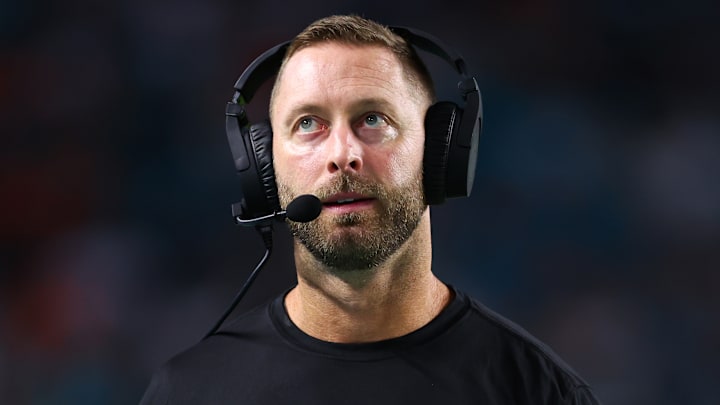If ever a game exemplified the adage 'a win is a win', it was the Washington Commanders’ hard-fought victory over the division rival New York Giants. It marked Dan Quinn’s first success as head coach and moved his team to 1-1 for the campaign.
It was also a triumph for new kicker Austin Seibert, who etched his name into the Washington record book by going seven for seven on field goals, accounting for all Commanders points. The team also got big games from Brian Robinson Jr., Zach Ertz, Noah Brown, and even the beleaguered Benjamin St-Juste.
They didn’t punt once for the first time in forever. Jayden Daniels got the wind knocked out of him and missed a throw or two, but the rookie quarterback generally stood up to pressure and made big plays when needed.
But the Commanders also got very lucky. Graham Gano injured himself on the opening kickoff, which had a major impact on the rest of the game. Note to kickers - do not try to tackle anyone. You will get hurt. Punters can tackle people but not kickers. Not unless you are Sebastian Janikowski and outweigh everyone on the field by 50 pounds.
They were lucky that Malik Nabers chose a terrible time for his only drop. And that Dru Phillips got nailed with a very iffy holding call that gave Washington a first down when they probably would have had to punt late. But injuries, drops, and bad penalties are part of the game.
So is the red zone. And there is one big thing Washington has to fix heading into next week.
Commanders offense must improve first-down efficiency moving forward
Of course, the most obvious thing is the red zone. And not just red zone offense. The red zone defense wasn’t very good either. But red-zone problems seem a little too obvious. You all saw it. You know full well that Washington needs to score touchdowns when they get inside the 20. That was one of the few things they did well last season.
I want to mention something else that the Commanders need to address. If they do, it will help in the red zone. Washington’s offense needs to be better on first downs.
Washington ran 30 first down plays. They committed penalties on three of them and had one kneel-down at the end of the first half. At first glance, the numbers don’t look too bad.
Excluding the kneel down and the penalties, the Commanders averaged 4.7 yards on first down. They also averaged 6.2 yards per play for the entire game, which suggests they were far better on later downs. Regardless, 4.7 yards on first down would seem to be a good number, routinely allowing a lot of flexibility in second and third-down play-calling.
The penalties cannot be disregarded. That was a major problem for Washington’s offense all day. If you include the infringements, Washington’s first-down average drops to 4.2. That’s not a bad number - provided you are not committing penalties. If you are repeatedly being flagged for false starts, that 4.2 goes from being a serviceable number to a problem.
Most teams use the following standard for whether a first-down play is successful. It needs to account for 40 percent of the required first down (or touchdown) yardage. If there were no penalties in a game, then four yards per play seems fine. But two things mess up that analysis.
As we all saw too often against the New York Giants, there are penalties. And second, yards per play can be skewed by a couple of big plays. So you have to look at each play as a separate entity.
Of the 29 first-down plays against the Giants, Washington was successful on 14 of them. That’s a 48% success rate. It is not the worst in the league. As long as the Carolina Panthers remain in the NFL, you never have to worry about the absolute worst. But it is not good enough, especially for a team that has been struggling defensively.
Kliff Kingsbury’s balance was perfect. Fifteen runs and 14 passes. Daniels was sacked once and scrambled once to make it look like there were a few extra running plays, but the calls were almost 50/50. And the plays all had a virtually equal success rate.
The problems tended to come from the types of pass plays that were called. Simply put, when Daniels threw the ball downfield, he had success. When a short throw was called, he did not.
Washington attempted five bubble screens to receivers on first down and only one of them worked. That went to Olamide Zaccheaus late in the contest for eight yards. The others resulted in a net loss.
On the other hand, when Daniels went downfield, usually to either Ertz or Brown, he had much better success. Those plays all work together. One of the reasons you throw a bubble screen is to try to suck the defenders toward the line so that you can go over them deep later. But Washington’s downfield shots were generally deep slants in the middle of the field.
They never took a deep shot on a seam and jet route. That’s ideally what those bubble screens are setting up.
If your offense cannot take advantage of corners pinching forward, then there’s not much reason to throw repeated bubble screens. Especially when they are not working.
Kingsbury certainly has some good things to build on coming out of this game, but those first-down bubble screens are not one of them. I’d look for more play-action and downfield shots on first down going forward.
